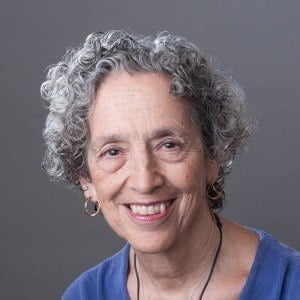Ruth Messinger
Most importantly to me, he wasn't afraid to use his talents and unique perspective to push for America to be a better version of itself.

Global Ambassador, American Jewish World Service
New York
A Jewish Perspective
My mother, Marjorie Wyler, arrived at JTS through a series of accidents. She was raised Jewish, but she did not have a sophisticated understanding of Judaism from her childhood. She pursued that understanding as an adult. When she found herself working at the Jewish Theological Seminary with Chancellor Finkelstein as the Head of Public Relations, Radio, and Television, she became responsible for explaining the intricacies of Judaism–everything from text to holidays to observance—to both Jews, who tended to have their own version of Judaism, and to the broader world. There was an immediate connection between her work and Heschel. He was the perfect conduit for conveying Judaism and Conservative Judaism in ways that would make a difference to varied audiences.
Separate from her work at JTS, she was attracted to Heschel’s ideas. I first heard about him through her. As I became very active in the civil rights and anti-war movements, she brought this iconic person to my attention. My mother would have presented the breadth of Heschel; he marched with Doctor King, but he’s much more complex than this. She introduced what he was saying about civil rights, why he’s engaged, what he’s saying about democracy, what he’s saying about the war. She gave me a fuller picture than most people had or have of Heschel.
Heschel was a man out of time and space. If you come to any country from somewhere else, you can see things that people who live here don't see. Heschel not only saw the American people, but opened himself up to reflecting on and frankly, making new Torah for the US. He knew everything about text, teaching the prophets and Judaism, but that didn’t stop him from developing new perspectives. Most importantly to me, he wasn’t afraid to use his talents and unique perspective to push for America to be a better version of itself.
I can sum up my career in public service and nonprofit leadership in one sentence using Heschel’s words: “In a free society, some are guilty, but all are responsible.” This quote appeared on the masthead of every newsletter I printed as both a city council member and Manhattan Borough president. When I ran American Jewish World Service (AJWS), I spent a great deal of time talking to Jews about why they should care about people in the rest of the world, and that quote was my most powerful tool.
In my capacity at AJWS, I was often asked what my favorite country was to visit. After mentioning specific projects, or food and travel, I would always add Cambodia and Haiti. In both of those instances, we, the United States, created the structural problems AJWS was attempting to combat. Although I was not personally guilty for creating American foreign policy towards these countries, I can name the guilty parties, and in both cases, they were my government. While I am not guilty, I am responsible.
I spend a lot of time talking to college students. In these settings, I quote Heschel’s final interview on NBC. I believe Heschel told the interviewer, Carl Stern, to ask him what advice he had for young people. This may be apocryphal, but that’s the way I like to tell the story. Heschel answered with the world’s most amazing, succinct quote:
Let them be sure that every little deed counts, that every word has power, and that we can—every one—do our share to redeem the world in spite of all absurdities and all frustrations and all disappointments. And above all, remember that the meaning of life is to build a life as if it were a work of art.
The first half is a good reminder to people, especially today, when they can so easily make fools of themselves on social media. Focusing on the second half—“build their lives as if they were a work of art”— I love that concept and seeing how it resonates with younger people. I ask them when you think of your life as a sculpture in a public place, what are you going to put on that sculpture?
